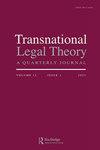The Trojan Horse of sovereign debt
Q2 Social Sciences
引用次数: 0
Abstract
This article analytically attends to the question: ‘what gets activated through’ the regime of sovereign debt today. Beyond the headlines of loans, debt, debt relief, restructuring, default and other terms of the trade, what is it that gets activated through creditor–debtor relations in the Global South? Four answers are set out: extortion and subordination in the guise of official credit; legal construction of an apolitical economy; austerity as a technique of social and political control; and lastly, as part of a quartet of forevering reign by debt, reversing social rights expectations and permanently embedding poverty. The explanation for the mystery of an unfathomable economic logic is that there must be a different scheme at work.主权债务的特洛伊木马
本文从分析角度探讨了 "是什么激活了 "当今的主权债务制度这一问题。除了贷款、债务、债务减免、重组、违约和其他交易条件这些标题之外,在全球南部,是什么通过债权人-债务人关系被激活?本文提出了四种答案:以官方信贷为幌子的勒索和从属关系;非政治性经济的法律构建;作为社会和政治控制手段的紧缩政策;最后,作为债务永远统治、社会权利预期逆转和贫困永久根深蒂固的四重奏的一部分。对深不可测的经济逻辑之谜的解释是,一定有一个不同的计划在起作用。
本文章由计算机程序翻译,如有差异,请以英文原文为准。
求助全文
约1分钟内获得全文
求助全文
来源期刊

Transnational Legal Theory
Social Sciences-Law
CiteScore
2.10
自引率
0.00%
发文量
7
期刊介绍:
The objective of Transnational Legal Theory is to publish high-quality theoretical scholarship that addresses transnational dimensions of law and legal dimensions of transnational fields and activity. Central to Transnational Legal Theory''s mandate is publication of work that explores whether and how transnational contexts, forces and ideations affect debates within existing traditions or schools of legal thought. Similarly, the journal aspires to encourage scholars debating general theories about law to consider the relevance of transnational contexts and dimensions for their work. With respect to particular jurisprudence, the journal welcomes not only submissions that involve theoretical explorations of fields commonly constructed as transnational in nature (such as commercial law, maritime law, or cyberlaw) but also explorations of transnational aspects of fields less commonly understood in this way (for example, criminal law, family law, company law, tort law, evidence law, and so on). Submissions of work exploring process-oriented approaches to law as transnational (from transjurisdictional litigation to delocalized arbitration to multi-level governance) are also encouraged. Equally central to Transnational Legal Theory''s mandate is theoretical work that explores fresh (or revived) understandings of international law and comparative law ''beyond the state'' (and the interstate). The journal has a special interest in submissions that explore the interfaces, intersections, and mutual embeddedness of public international law, private international law, and comparative law, notably in terms of whether such inter-relationships are reshaping these sub-disciplines in directions that are, in important respects, transnational in nature.
 求助内容:
求助内容: 应助结果提醒方式:
应助结果提醒方式:


